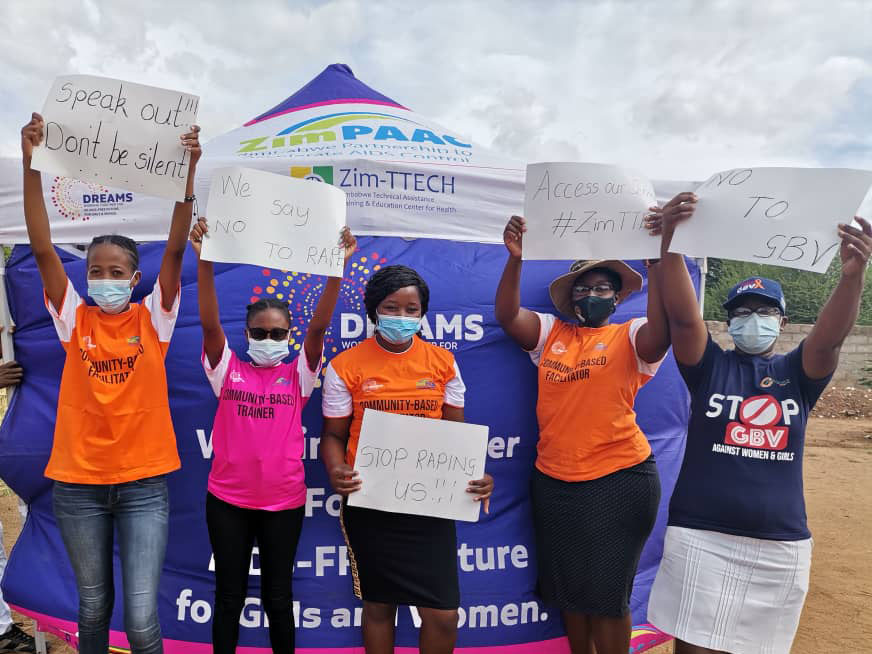
After facing incredible obstacles, three resilient 22-year-old women from Tsholotsho District, Zimbabwe, found their lives intersecting: Sitheni, Clemencia, and Faith are DREAMS ambassadors, equipping adolescent girls and young women with skills to reduce their vulnerability to contracting HIV–and helping them to find their own strengths.
DREAMS (Determined, Resilient, Empowered, AIDS-free, Mentored, and Safe) is a PEPFAR-funded program that aims to reduce HIV infections among adolescent girls and young women through not only prevention and treatment, but also a core curriculum that addresses HIV prevention, financial literacy, and gender-based violence (GBV). Participants can also access services such as HIV testing, family planning, pre-exposure prophylaxis (PrEP), counseling, and screening for GBV.
The International Training and Education Center for Health (I-TECH) has been supporting the Zimbabwe Technical Assistance, Training and Education Center for Health (Zim-TTECH) and its ZimPAAC consortium to implement the DREAMS program since 2020. To date, nearly 20,000 girls and young women in Zimbabwe have completed the primary DREAMS curriculum, Health for Life.
Sitheni, Clemencia, and Faith were initially enrolled in the DREAMS program as beneficiaries, having turned to transactional relationships (trading sex for money or necessities) to survive poverty amid the deepening economic crisis in Zimbabwe. They now use their own experiences to give back to young women who face similar choices.
Sitheni had to abandon her life-long goal of attending university to support her parents and four siblings; carrying the burden of sole provider for her family took a toll on her. When earnings from her part-time jobs weren’t enough, she became involved in sexual relationships with older, cross-border traders—known as omalayitsha—to make extra money.
Once enrolled in the DREAMS program, she thrived within the Health for Life courses, which cover financial literacy, social asset building, condom education, and violence and HIV prevention. “I encourage young girls in my community not to depend on men, but to use their skills instead of waiting to be given money by men who will abuse them,” Sitheni says.
Training and services are often provided in a safe space such as a school or community center, where participants meet with a mentor trained to deliver the Health for Life curriculum.
“At the moment I mentor 140 adolescent girls and young women aged 15-24 in the district,” says Faith, who also dated older men for money in order to make ends meet. “It is my duty to link adolescents with the district clinical nurse to access services at health facilities and safe spaces. I also encourage women to support people living with HIV/AIDS in the community. I teach them about human rights and encourage them to utilize their talents to make a living.”
Another part of Faith’s job is enrolling and following up on beneficiaries as well as supporting community-based facilitators who teach social asset building. This includes facilitating relationships and connections within DREAMS safe spaces to share encouragement and survival skills.
These safe spaces were critical to providing hope and new options for Clemencia. “After my father passed away, there was no one to pay for my school fees,” she says. “I came to my wits’ end, and I ended up exchanging sex for livelihood. At that time, it seemed the only viable option.”
Clemencia traded sex for two-and-a-half years, placing her among those at highest risk for HIV acquisition in Zimbabwe.[1] “Luckily for me, I did not get infected with HIV,” she says. “Ever since joining DREAMS, I have become empowered, and I know how to protect myself from sexual violence.”
Thanks to what she learned in her financial literacy sessions, Clemencia has started a small business of breeding hens and selling them to community members. “I also sell clothes for extra income,” says Clemencia, who now encourages other young women to complete their financial literacy sessions so they can start their own businesses and become independent.
Faith is thrilled to be able to foster this independence, as well. “Little did I know that I could make an honest living without anyone having expectations from me,” she says. “I am now able to encourage other girls and young women to stop engaging in transactional relationships. I am able to do this because I have been mentored and I have knowledge about HIV/AIDS and violence against women.”
[1] Chiyaka T, Mushati P, Hensen B et al. Reaching young women who sell sex: Methods and results of social mapping to describe and identify young women for DREAMS impact evaluation in Zimbabwe. PLoS One. 2018 Mar 15;13(3):e0194301. doi: 10.1371/journal.pone.0194301. eCollection 2018.